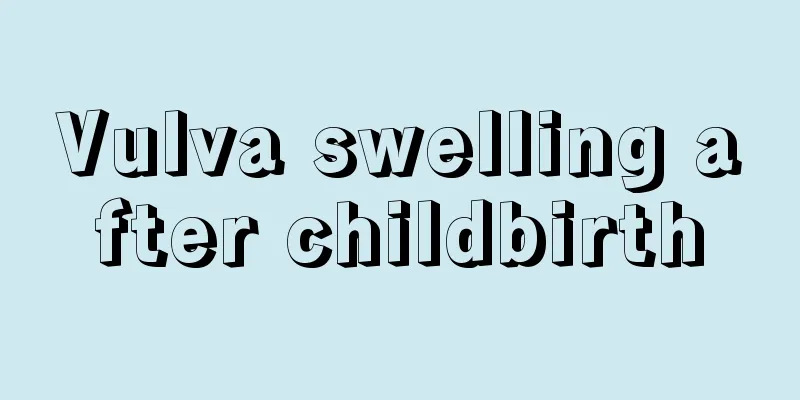Vulva swelling after childbirth

|
Many mothers are actually very worried about giving birth. Because during childbirth, one has to face tremendous pain. In fact, in addition to the pain during childbirth, many mothers experience swelling of the vulva after giving birth, and may also experience certain pain or other discomfort symptoms. At this time, mothers should pay attention to a good lifestyle. At the same time, you can eat some anti-inflammatory and analgesic foods for conditioning. 1. Should we avoid eating cold fruits and vegetables? Contains crude fiber to help with bowel movements There is a saying among the people: "Before giving birth, you are like a ball of fire, and after giving birth, you are like a piece of ice." Therefore, mothers cannot eat various cold things during the confinement period, otherwise they will suffer from "confinement disease." Vegetables and fruits are "cold things", so they must be strictly avoided. Explanation: In fact, most mothers move less during the confinement period, and their intestinal motility is not as good as usual. Foods high in crude fiber such as vegetables and fruits can help with bowel movements. As long as the vegetables are cooked and you eat less cold vegetables such as bitter melon, there is basically no problem. Moreover, fruits and vegetables contain a large amount of vitamins essential to the human body, which cannot be supplemented by eating any amount of meat. Postpartum women sweat easily and have a high metabolism. Drinking more water can prevent the loss of water in the body from being greater than the intake, which will cause dehydration and affect the secretion of milk. 2. There is also a saying among the people that women who have just given birth cannot eat salt during the confinement period. Explanation: As long as the mother does not have pathological conditions such as gestational hypertension, there is no need for ordinary mothers to "avoid salt"; on the contrary, mothers who sweat too much should also supplement salt appropriately to prevent sodium deficiency in the body and cause low blood pressure or dizziness. Traditionally, you cannot wash your hair during the confinement period. This is because the environment at home was relatively poor in the past, and it was easy to get confinement diseases after washing your hair. Now that conditions are better, you can wash your hair if the temperature and water temperature are appropriate. Depending on the mother's personal physical condition, you should not wash your hair within one week after delivery. |
<<: Does cervical conization affect sexual life?
>>: How long after painless uterine curettage can I eat?
Recommend
What is the reason for green vaginal discharge? Is it a disease?
Green leucorrhea is definitely abnormal. Normal l...
What are the consequences of abnormal uterine development?
It is well known that the uterus is very importan...
White fluid discharge during pregnancy
A woman's body will undergo various changes a...
What are the steps for scraping putty on gypsum board? What material is putty powder?
When applying putty, you don't need to apply ...
How to eradicate vaginal candidal infection
Candidal vaginitis is a common gynecological dise...
How often should I eat preserved egg and lean meat porridge? What are the tips for making preserved egg and lean meat porridge?
Although preserved egg and lean meat porridge tas...
What are the benefits of cranberry for women? How to make cranberry
Cranberries are not only brightly colored and del...
What are the nutritional values of black olives? How to eat black olives
Olives are characterized by thin skin, thick fles...
At what age do breasts stop growing?
When girls reach puberty, due to the secretion of...
Why do women's underwear turn yellow?
Women's underwear is the clothing that comes ...
What causes lower back pain and bloody vaginal discharge during confinement?
Many female friends will suffer from back pain du...
Nursing methods for itchy episiotomy wounds during normal delivery
Many friends who have just given birth will exper...
How to determine the fetal heart rate monitoring chart
Many pregnant mothers are confused when they get ...
How to repair thin stratum corneum? What facial cleanser should I use for thin stratum corneum?
Nowadays, most people are very concerned about th...
What are the symptoms of cervical polyps
Cervical cyst is a common gynecological disease a...









